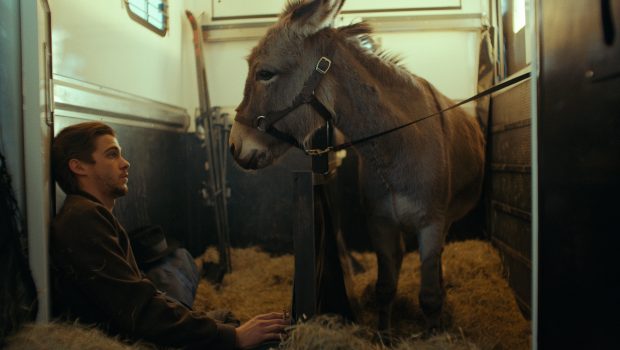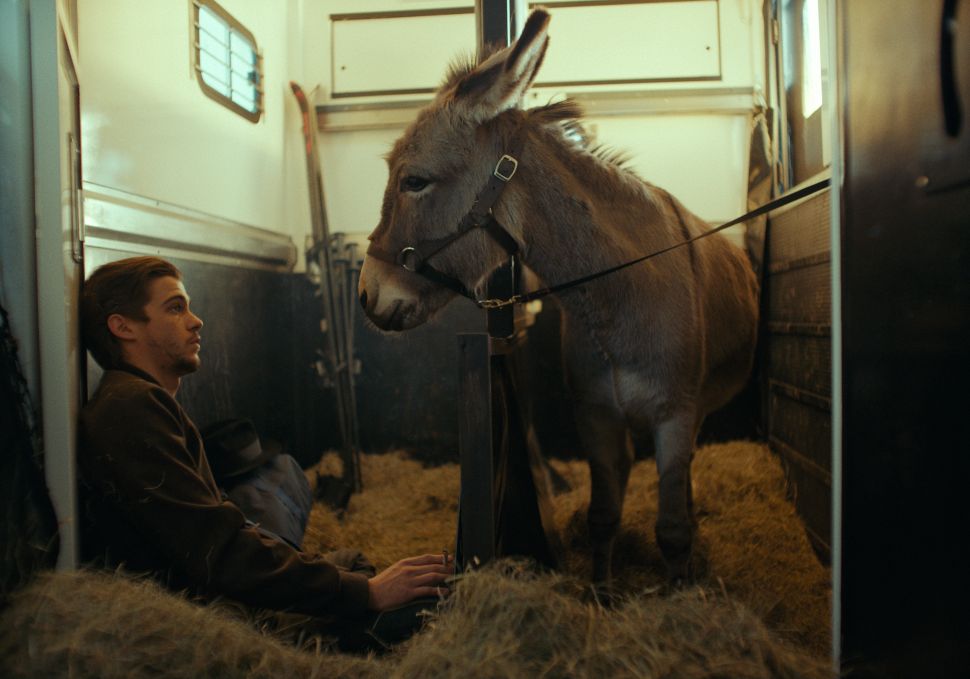It’s hard out there for a donkey—at least cinematically speaking.
|
EO ★★★ 1/2 (3.5/4 stars) |
It certainly was no cakewalk for cinema’s reigning jackass, the titular beast of Au Hasard Balthazar, Robert Bresson’s soul-stirring examination of human cruelty, which, even perched at number 16 in Sight and Sound’s 100 Greatest Films of All-Time, remains perhaps moviedom’s most underappreciated masterpiece.
EO is a successful attempt by 84-year-old Polish filmmaker and sometimes actor Jerzy Skolimowski to both update and add color to the cinematic conversation about despair, purpose, and braying that Bresson started more than a half century ago.
There are many harmonic convergences between the two films. Both donkeys are connected to the circus—EO begins there while that stop is midway through Balthazar’s plight—and both start their life’s journey being loved deeply by a young girl.
It is Kasandra (Sandra Drzymalska, from the Polish-language Netflix comedy Sexify) who gives EO his name, her heart, and also a sense of purpose when he becomes the focus of her act, which has the animal seemingly being raised from the dead under a garish red strobe light. (You can see where Skolimowski is going when, shortly after being sold at auction by the bankrupt circus, EO isn’t baptized as Balthazar once was, but an industrial farming building is.)
There are other notable differences between this and the Bresson film. Whereas Balthazar never strayed far from the Pyrenees village of his birth, EO is put on a trans-European adventure, making Skolimowski’s film a subtle commentary on the darker aspects of an open border economy. We also see more of what he sees—horses running in a field, the snow topped Carpathian Mountains—and he emotes more, seemingly crying when separated from Kasandra. And no filmmaker has ever been able to match the austere, intense minimalism that has made Bresson perhaps the most profound director who ever lived.
Still, Skolimowski is able to bring his own style and acute sense of purpose to his donkey tale.
Where Balthazar plays as an existential rumination on sacrifice and a Christ fable, Skolimowski’s film is squarely locked on the profound and sometimes terrifying imbalance between nature, humans, and technology. In this way, his film is cut from a similar cloth as Godfrey Reggio’s cult experimental documentary Koyaanisqatsi, with moments where narrative is set aside in favor of thematic exploration.
When his whinny helps disrupt a local soccer match, leading to a missed penalty kick, EO becomes the target of violent hooligans, and appears to emerge from the near fatal beating (Skolimowski, an animal lover, goes to great pains to assure us that no animals were hurt in this production) a four-legged robot. When earlier he escapes into a forest filled with wild creatures, he is simultaneously greeted with green lasers that could have come from an alien UFO.
Being a deeply weird arthouse movie made by a celebrated European auteur, of course Isabelle Huppert must show up. The reigning maven of on-screen intensity plays a dishes-breaking countess fed up with the wastrel ways of her stepson (Mateusz Kościukiewicz), who absconded with EO after he stumbled upon him at a crime scene and brings him home to much on the manicured lawn of his soon be sold family villa.
The dark-toned orchestral score from the award-winning Polish clarinetist and composer Paweł Mykietyn—it ranks among of the very best pieces of music composed for a film this year—serves to both ground the film’s flights of fancy and add a primordial urgency to EO’s plight.
While the movie is every bit as dark and sad as Bresson’s classic, it also brims with the joy that Skolimowski clearly had in making it. You can feel it in the sense of mischief and desire for freedom he imbues in EO; you can even see it in the way the director name-checked every last donkey who played EO in his acceptance speech at Cannes, where the film won a Jury Prize.
Like most good art, EO is better felt then interpreted or completely understood. The world isn’t easy, the cinema’s great donkeys seem to be telling us; but when we are able to look at it through their wide-eyes—see what without the work of great directors would otherwise forever be unseen—we might learn something important about how to better make it through.
Observer Reviews are regular assessments of new and noteworthy cinema.









Gloss